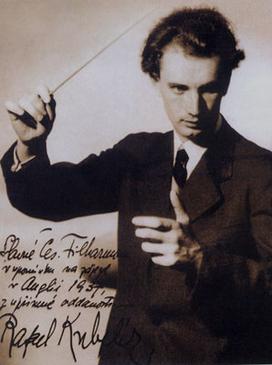
Rafael Kubelík
Rafael Jeroným Kubelík, KBE (29 June 1914 – 11 August 1996) was a Czech conductor and composer.
The son of a distinguished violinist, Jan Kubelík, he was trained in Prague and made his debut with the Czech Philharmonic Orchestra at the age of 19. Having managed to maintain a career in Czechoslovakia under the Nazi occupation, he refused to work under what he considered a "second tyranny" after the Communist Czechoslovak coup d'état of 1948, and took refuge in Britain. He became a Swiss citizen in 1967.
Kubelík was music director of the Chicago Symphony Orchestra (1950–53), musical director of The Royal Opera, Covent Garden (1955–58). In 1957, he conducted and recorded the World premiere Berlioz's Les Troyens. From 1961 to 1979, he was music director of the Bavarian Radio Symphony Orchestra, and was a frequent guest conductor for leading orchestras in Europe and America.
As a composer, Kubelík wrote in a neo-romantic idiom. His works include five operas, three symphonies, chamber music, choral works, and songs.
Life and career[edit]
Early life[edit]
Kubelík was born in Býchory, Bohemia, Austria-Hungary, today's Czech Republic, the day after Archduke Ferdinand's assassination that triggered the First World War. He was the sixth child of the Bohemian violinist Jan Kubelík, whom the younger Kubelík described as "a kind of god to me". His mother was a Hungarian countess, Anna Julie Marie Széll von Bessenyö.[1] Kubelík studied the violin with his father, and entered the Prague Conservatory at the age of 14, studying violin, piano, composition, and conducting.[1] He graduated from the conservatory in 1933, at the age of 19; at his graduation concert he played a Paganini concerto and a composition of his own for violin and orchestra. Kubelík was also an accomplished pianist, and served as his father's accompanist on a tour of the United States in 1935.
Brno[edit]
In 1939, Kubelík became music director of the Brno Opera, a position he held until the Nazis shut the company down in November 1941.[1] The Nazis allowed the Czech Philharmonic to continue operating; Kubelík, who had first conducted the orchestra when he was 19, became its principal conductor.[1] In 1943 he married the Czech violinist Ludmilla Bertlová, with whom he had one son.[2]
In 1944, after various incidents, including one in which he declined to greet the Nazi Reichsprotektor Karl Hermann Frank with a Hitler salute, along with his refusal to conduct Wagner during the War, Kubelík "deemed it advisable to disappear from Prague and to spend a few months undercover in the countryside so as not to fall into the clutches of the SS or Gestapo".[3] Kubelík conducted the orchestra's first post-war concert in May 1945. In 1946, he helped found the Prague Spring Festival, and conducted its opening concert.[2]
Defection[edit]
After the Communist coup of February 1948, Kubelík left Czechoslovakia, vowing not to return until the country was liberated. "I had lived through one form of bestial tyranny, Nazism," he told an interviewer, "As a matter of principle I was not going to live through another." He defected during a trip to Britain, where he had flown to conduct Mozart's Don Giovanni with the Glyndebourne company at the Edinburgh Festival.[1] He had been engaged on the recommendation of Bruno Walter, whom Kubelík had assisted in this work at the 1937 Salzburg Festival. Kubelík told his wife of his decision to defect as their plane left Czechoslovakia.
In 1953, the Communist government convicted the couple in absentia of "taking illicit leave" abroad. In 1956, the regime invited him back "with promises of freedom to do anything I wanted," said Kubelík, but he refused the invitation. In a 1957 letter to The Times, Kubelík said he would seriously consider returning only when all the country's political prisoners were freed and all émigrés were given as much freedom as he would have possessed. He was invited back by the regime in 1966 but again refused; in 1968, after the Prague Spring had been ended by the Soviet invasion, he organised an international boycott, in which many of the major classical artists of the West participated.[4]